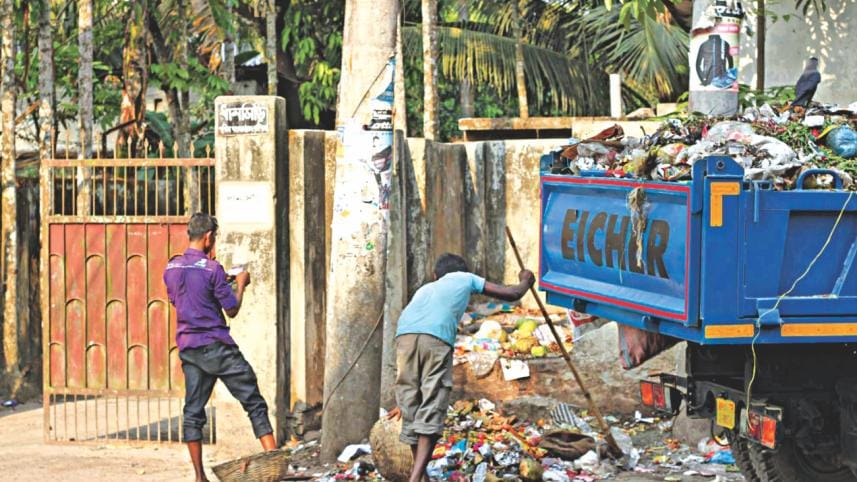Is this how we respect a poet?

The ugly sight of a dustbin with spilling garbage strikes visitors, just near the entrance to Poet Jibanananda Das Memorial Library and Auditorium in Barisal.
The memorial is only a small portion of the house where the acclaimed poet of the last century grew up and lived his youth until he moved to Kolkata in 1930. The rest of the poet's residence in the city's Munshi Garage area was turned into government establishments.
The authorities' apathy is vivid even in preserving the last remaining legacy of the poet in Bangladesh.
While the entire house should have been restored in his memory and honour, it now seems to be going into oblivion.
“We have seen changes of mayors and commissioners but the dustbin has been there though locals have repeatedly demanded its removal,” said Waliur Rahman, a businessman living in the neighbourhood.
“What a way to honour the poet!” he added with a hint of sarcasm.
The memorial was set up in February 2010. The dustbin stood there even before as the Barisal City Corporation installed it in 2007.
It is shameful that people throw waste and garbage every day “almost into the house of the poet” who is famous for the collection of poems, Ruposhi Bangla.
While writing those poems in Kolkata, Jibanananda laid bare his emotions for this part of the Bengal. He wished to be reborn to come back to the banks of the Dhansiri river that gives an overwhelming sense of longing for nature.
Mehedi Hasan, a resident of Munshi Garage area and student of class-IX, said the foul smell spoils the environment of the library.
“I do not understand how a dustbin could be placed in front of a famous person's house that many people come to visit. Nobody is taking any step to shift it.”
Many journalists and photographers came here in the last two years to publish news over the issue but nothing worked, said Nayon, a tea vendor in the area.
Mohammad Mushin, founder of Adda Dhanshiri, an organisation that researches into the poet's works, said the organisation had asked the authorities several times to remove the dustbin from there but to no avail.
“I have visited the house a hundred times with different visitors, including foreign guests. They all criticised the authorities for placing the dustbin in front of the famous poet's house,” said Mushin, a professor of English and dean of the social science faculty at Barisal University.
Students of the university and Braja Mohan College where Jibanananda served as a lecturer in 1935 have recently organised a human chain, pressing the same demand.
The city corporation is ready to move the dustbin elsewhere, said Dipok Lal Mridha, officer of the cleaning and waste management of the city corporation.
But all that needs is an order from the mayor, he said.
The mayor could not be reached by phone for comments.
The city corporation will shift all the temporary dustbins from the city soon, said its Chief Executive Ranajit Kumar.
Meanwhile, people of Bangladesh who find Jibanananda very close to their hearts will recite his poems for their love for the country.



 For all latest news, follow The Daily Star's Google News channel.
For all latest news, follow The Daily Star's Google News channel.
Comments